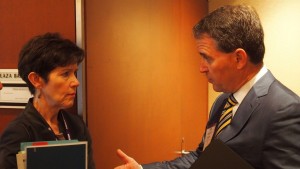
The AMA Annual meeting in Chicago concludes today after nearly five days of networking and setting the agenda for organized medicine for 2017. The North Carolina delegation at the meeting made sure our state’s perspective was well represented.
North Carolina Medical Society (NCMS) CEO Robert Seligson brought NCMS members’ concerns about several Veterans Administration issues directly to Carolyn Clancy, MD, the VA’s Deputy Undersecretary for Health at the meeting.
Seligson spoke with Dr. Clancy, who was a speaker at the NCMS Annual Meeting in 2014, about payment delays for physicians seeing veterans under the Veterans Choice program. The NCMS has been helping over 30 practices resolve prior authorization and payment issues under this program. Seligson also has worked closely with US Senator Richard Burr (R-NC), who earlier this year introduced legislation to fix the problems with the Choice program.
The other concern Seligson addressed with Clancy centered on the VA’s recent announcement on May 25 of a proposed rule to grant independent practice for Advanced Practice Registered Nurses (APRN) within the Veterans Health Administration. The 60-day comment period on this proposal ends on July 25.
The NCMS and several specialty societies have long opposed local legislation granting expanded scope or independent practice for APRNs. The NC Society of Anesthesiologists is strongly opposed to this latest proposal and has mounted a campaign to encourage their members to comment via the American Society of Anesthesiologists website at SafeVACare.
To review the proposed rule and comment directly through the federal register, click here.
Clancy was open to his comments, and understood the concerns, Seligson said.
“Rest assured, the NCMS is going to continue to push the VA on these issues with VA administrators as well as our elected representatives to protect our members and our veteran patients,” he said.


There is a big disparity in salaries in the VA system with NPs making much more than PAs, which I hope you can adresss as well.
If APRNs are granted independent practice status (which I am also against), then PAs in the VA system should also be granted this.